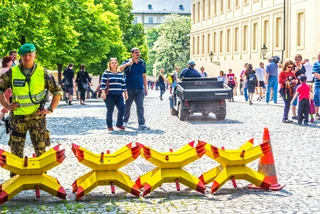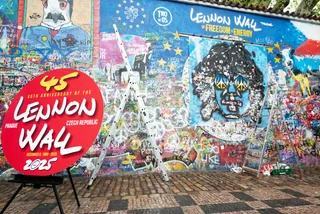A new photo exhibition, presented on a series of panels in Prague’s náměstí Republiky, is intended to showcase how anti-Putin Russians are supporting Ukrainians. Instead, the exhibit has brought on public anger.
On many of the panels, the word for “Russian” in both Czech and English had been defaced with tape, which has been removed and left behind tear marks. The logos for the City of Prague and the Prague 1 district, which are on the list of sponsors, are now covered in white tape.
A Czech Police car is now parked near the panels, which went up on Feb. 22 and will be in place until March 5.

The English-language panels say “Russians around the world helping Ukraine” along the bottom and slogans such as “Warmth for Ukraine – International,” “The Prague Russian Anti-war Committee,” Russians for Ukraine – Poland” and “Anti-war protests in Russia.” The Czech-language panels say (in translation) “For your and our freedom – Czechia” and “To work – Czechia.”

Pictures on the panels show Russians at protests in Prague and other places, supplies that Russians have helped to provide, and children in schools.

Russian intellectual Anton Litvin, who is behind the exhibition, told daily Deník N its goal "was to show solidarity with Ukraine and to show that Russians living in Prague are not only against [Russian President Vladimir] Putin and the war, but really help the Ukrainian army, refugees, women, and children."
Shortly after the panels went up, someone taped a sign to one saying “Russians [are] committing genocide against Ukrainians.” The paper has since been removed.
Litvin responded on Facebook that Russia's genocide of Ukrainians is something the Prague Anti-war Committee, which he is a part of, talks about in interviews and speeches. “Anyway, it's an important addition to the poster,” he said.
The exhibition is supported by the Boris Nemtsov Foundation for Freedom, which is named after the Putin critic who was murdered in 2015, and the Zimin Foundation, which was established by Russian entrepreneur Dmitry Zimin to support culture, health care, and science.













 Reading time: 2 minutes
Reading time: 2 minutes 



























